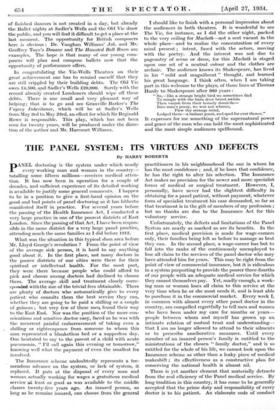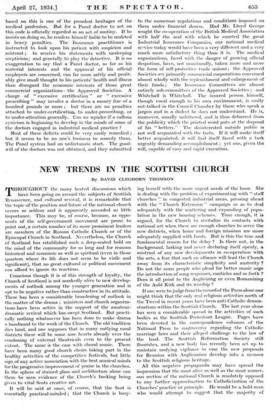THE PANEL SYSTEM : ITS VIRTUES AND DEFECTS
By HARRY ROBERTS PANEL doctoring is the system under which nearly every working man and woman in the country— totalling sonic fifteen millions—receives medical atten- tion. It has now been in operation for a couple of decades, and sufficient experience of its detailed working is available to justify some general comments. I happen to be in a position to give a first-hand opinion on the good and bad points of panel doctoring as it has hitherto manifested itself in practice. For several years before the passing of the Health Insurance Act, I conducted a very large practice in one of the poorest districts of East London. Since the passing of that Act, I have been respon- sible in the same district for a very large panel practice, attending much the same families as I did before 1912.
What was the situation in this typical slum area before Mr. Lloyd George's revolution ? From the point of view of the average sick person, it is hard to say anything good about it. In the first place, not many doctors in the poorer districts of our cities were there for their spiritual or intellectual health. For the most part, they were there because people who could afford to pick and choose among doctors had declined to choose them. The average skill and treatment closely COITC- spnuded with the size of the trivial fees obtainable. There are plenty of doctors who automatically give to every patient who consults them the best service they can, whether they are going to be paid a shilling or a couple of guineas ; but very few of these men found their way to the East End. Nor was the position of the more con- scientious and sensitive doctor easy, faced as he was with the recurrent painful embarrassment of taking even a shilling or eighteenpence from someone to whom this sum represented a blanketless bed or a supperless day. One hesitated to say to the parent of a child with acute pneumonia, " I'll call again this evening or tomorrow," knowing well what the payment of even the smallest fee involved.
The Insurance scheme undoubtedly represents a tre- mendous advance on the system, or lack of system, it replaced. It puts at the disposal of every man and woman actually working for wages a gratuitous medical service at least as good as was available to the middle classes twenty-five years ago. An insured person, so long as he remains insured, can choose from the general practitioners in his neighbourhood the one in whom he has the most confidence ; and, if he loses that confidence, he has the right to alter his selection. The Insurance Act makes no provision for the newer and more specialist forms of medical or surgical treatment. However, - personally, have never had the slightest difficulty in obtaining for a panel patient, without payment, whatever form of specialist treatment his case demanded, so far as that treatment is in the gift of members of my profession ; but no thanks are due to the Insurance Act for this voluntary service.
Unfortunately, the defects and limitations of the Panel System are nearly as marked as are its benefits. In the first place, medical provision is made for wage-earners only, their families being left as before to manage as best they can. In the second place, a wage-earner has. but to fall into the ranks of the continuously unemployed to lose all claim to the services of the panel doctor who may have attended him for years. This may be right from the point of view of commercial insurance, but it is ridiculous in a system purporting to provide the poorer three-fourths of our people with an adequate medical service for which they cannot themselves pay. Yet, madly enough, a work- ing man or woman loses all claim to this service at the very time when he or she most needs it, and is least able to purchase it in the commercial market. Every week I, in common with almost every other panel_ doctor in the country, am compelled regretfully to tell men and women who have been under my care for months or years— people between whom and myself has grown, up an intimate relation of mutual trust and understanding— that I am no longer allowed to attend to their ailments or to prescribe ameliorative measures. . Until every member of an, insured person's family is entitled to the ministrations of the chosen " family doctor," and is so entitled for the whole of his life, we cannot look upon the Insurance scheme as other than a leaky piece of medical makeshift ; its effectiveness as a constructive plan for conserving the national health is almost nil.
There is yet another element that materially detracts from the real efficiency of the Panel medical service. By long tradition in this country, it has come to be generally accepted that the prime duty and responsibility of eyery doctor is to his patient. An elaborate code of conduct based on this is one of the proudest heritages of the medical profession. But for a Panel doctor to net on this code is officially regarded as an act of mutiny. If he insists on doing so, he renders himself liable to be mulcted in heavy penalties. The Insurance practitioner is instructed to look upon his patient with suspicion and mistrust ; to receive his statements with unsleeping scepticism; and generally to play the detective. It is no exaggeration to say that a Panel doctor, so far as his material interests and the approval of his official employers are concerned, can far more safely and profit- ably give small thought to his patients' health and illness than disregard the economic- interests of those great commercial organizations—the Approved Societies. A charge of " excessive certification " or " excessive prescribing " may involve a doctor in a money fine of a hundred pounds or more ; but there are no penalties attached to under-certification, to under-prescribing, or to under-attention generally. Can we wpnder if a callous cynicism is beginning to develop in the minds of some of the doctors engaged in industrial medical practice ?
Most of these defects could be very easily remedied ; but it seems to be no one's business to remedy them. The Panel system had an unfortunate start. The good- will of the doctors_ was not obtained, and they submitted to the numerous regulations and conditions imposed on them under financial duress. Had Mr. Lloyd George sought the co-operation of the British Medical Association with half • the zeal with which he courted the great Industrial Insurance Companies, our national medical service today would have been a very different and a very much more satisfactory thing than it is. The medical organizations, faced with the danger of growing official despotism, have, not unnaturally, taken more and more the form of self-protective trade unions ; the Approved Societies are primarily commercial corporations concerned almost wholly with the replenishment and enlargement of their funds ; the Insurance Committees are almost entirely sub-committees of the Approved Societies ; and Whitehall is Whitehall. The insured person himself, though vocal enough in his own environment, is easily out-talked in the Council Chamber by those who speak a jargon and in a dialect he does not understand. He is, moreover, usually unlettered, and is thus debarred from the publicity which the printed word puts at the disposal of his " betters." The disinterested outside public is not well acquainted with the facts. If it will make itself better acquainted, it will find itself faced with a task urgently demanding accomplishment ; yet one, given the will, capable of easy and rapid execution.













































 Previous page
Previous page